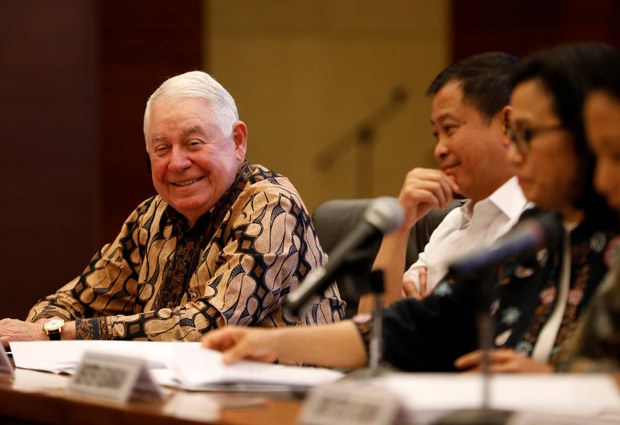Indonesia Signs $4 Billion Deal for Majority Stake in Copper Mine
2018.07.12
Jakarta
 Richard Adkerson, CEO of U.S.-based Freeport McMoRan Copper and Gold, (left), smiles during a news conference as Indonesia Energy and Mineral Resources Minister Ignasius Jonan and Finance Minister Sri Mulyani Indrawati look on in Jakarta, July 12, 2018.
Richard Adkerson, CEO of U.S.-based Freeport McMoRan Copper and Gold, (left), smiles during a news conference as Indonesia Energy and Mineral Resources Minister Ignasius Jonan and Finance Minister Sri Mulyani Indrawati look on in Jakarta, July 12, 2018.
Indonesia will pay almost U.S. $4 billion to acquire a majority stake in the world’s second-biggest copper mine located in eastern Papua province, President Joko “Jokowi” Widodo said Thursday, confirming a tentative deal with an American mining firm that caps years of wrangling over mining rights for the site.
The deal with Freeport McMoRan is expected to boost Jokowi’s nationalist credentials ahead of the 2019 elections when he is likely to seek a second term in office, supporters told BenarNews. Opponents, on the other hand, describe it as morally and legally flawed.
Jokowi called the deal a leap forward.
“For 3½ years we had tough negotiations and the past 1½ years were even more intense,” he told reporters.
“We hope in the future we will have bigger revenue from tax, royalties and dividends,” he said. “Our national interests should come first.”
Separately, Freeport and Indonesian officials told a news conference that under the agreement formalized after complex discussions, state-owned PT Indonesia Asahan Aluminum, or Inalum, would pay $3.85 billion for 51 percent of Grasberg mine, Freeport’s local unit.
The Indonesian government currently has a 9-percent stake.
Freeport officials said many issues must be resolved, including the U.S.-based company’s long-term rights in the country, an agreement on the disposal of tailings waste and provisions allowing it to operate its flagship copper-and-gold mine even when it is no longer the majority owner.
Grasberg mine near Puncak Jaya, the highest mountain in Papua, has about 20,000 employees.
In a statement issued Thursday, Freeport emphasized it expects to remain in charge of operations in the mining complex, regardless of its stake after the conclusion of the divestment, which it expects to take place in the second half of this year.
In August 2017, the company said it was giving up a majority of its ownership in exchange for being allowed to operate the Indonesian mining complex until 2041.
After that announcement, the Amungme and Kamoro tribe communities met with Jokowi in Jakarta to express their concerns.
![180712-ID-Mine-1000.jpg Freeport McMoRan's gigantic Grasberg mine lies in the mountains of eastern Indonesia's remote province of Papua, Aug.16, 2013. [AFP]](/english/news/indonesian/copper-mine-07122018165905.html/180712-ID-Mine-1000.jpg/@@images/d91fbd6a-3b7d-4de7-bd0e-c30c0970a1fb.jpeg)
CEO lists benefits
The agreement would provide direct benefits to the local and central governments, Richard Adkerson, Freeport McMoRan’s CEO, told the news conference. Including dividends to Inalum, he said, those benefits would be between $60 billion and $90 billion.
As part of the agreement, Freeport agreed to construct a smelter in Indonesia by 2022. Adkerson has previously estimated that smelter to cost $2 billion.
Budi Gunadi Sadikin, Inalum’s president-director, told reporters the tentative agreement would be beneficial to the country.
“We stand to get half of the company’s average annual profit, which is U.S. $2 billion a year,” he said.
Under the deal, the government of Papua province will also get a 10-percent stake in Freeport, a move that Finance Minister Sri Mulyani Indrawati said could help improve the welfare of Papuans.
Jokowi has visited Papua, a region that is one of Indonesia’s poorest with low literacy rates, at least eight times since taking office in 2014. The president’s nationalistic stance is popular in the province amid a clamor for the country to have more control of its vast resources.
The agreement drew mixed reactions.
“Thank God. After 50 years being controlled by foreigners, Freeport is back in the embrace of motherland in July 2018,” popular musician Addie MS said on Twitter. “Thank you President Jokowi and all the ministers who have fought for 3.5 years.”
But Merah Johansyah, an activist with the Mining Advocacy Network, a non-governmental organization, said the agreement was “morally and legally flawed” because Papuans were not given a say during the deal negotiations.
“It was conducted by the government – represented by the finance ministry, energy ministry and the state enterprise ministry – and Freeport,” he told BenarNews.
“The most important component, which is the people of Papua, were left out,” he said. “Whether the people still need the presence of Freeport is up to Papuans. There should be a referendum on the existence of Freeport.”
Foreign media access is restricted in Papua, a former Dutch colony that was absorbed into Indonesia in 1969 after a controversial referendum. The region has been home to a low-level armed separatist movement, the Organisasi Papua Merdeka, for decades. That rebel group and Indonesian security forces are both guilty of human rights abuses, rights groups said.
Marwan Batubara, executive director of Indonesian Resources Studies, told BenarNews the price of the controlling stake was too high.
“The price was agreed on the condition that the contact is extended to 2041, while the power to extend it is in our hands. We should have used that power to our benefit,” he said.
Zahara Tiba in Jakarta contributed to this report.
![189712_ID_Freeport_inside.jpg Activists give the thumb down sign during a protest against Freeport-McMoRan outside the building that houses the U.S. mining giant's offices in Jakarta, April 7, 2017. [AP]](/english/news/indonesian/copper-mine-07122018165905.html/189712_ID_Freeport_inside.jpg/@@images/0f54b065-7cf5-4f2f-9fe0-2c9c456c0202.jpeg)







